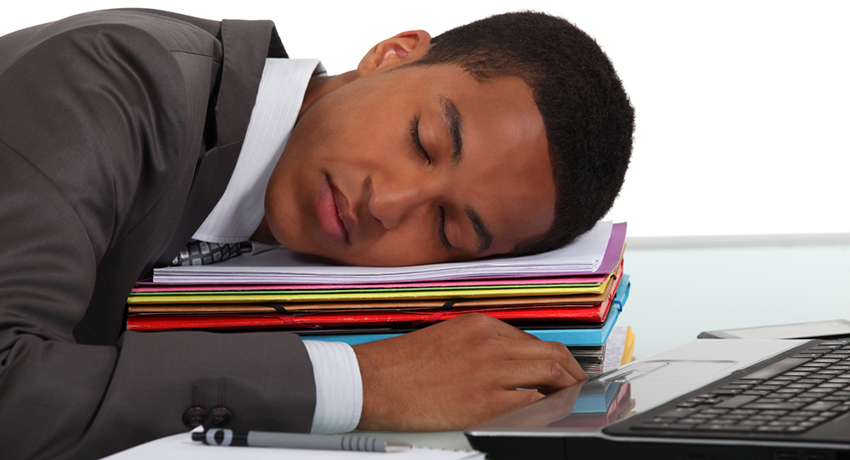It’s That Time of Year Again: Daylight Savings

Sleepy worker image via shutterstock
We get an extra hour of sleep Sunday, November 3, when clocks are pushed back for Daylight Saving Time. And most of us here in Boston could really use it because we’ve been up late every night for two weeks watching the Red Sox in the playoffs and World Series. But Dr. Douglas Kirsch, a neurologist in the Division of Sleep Medicine at Brigham and Women’s Hospital (BWH) says that we should be wary of how this shift in time can affect the body and mind. Though the time change in the spring can be more problematic due to the loss of an hour of sleep, for some people, he says, any change in schedule can be disruptive to their sleep. To cope with the time change, Dr. Kirsch offers some tips to prepare and manage the time shift, and hopefully sleep better all year long.
Avoid stimulants that can have an effect on wakefulness: Stay away from caffeine after mid-afternoon, especially a few days before and after the change, Kirsch says. “Try not to nap during this time as well, since napping in the late afternoon can decrease your ability to sleep at night,” he adds.
Sleep eight hours a night: “Some people use the extra hour to try to get more chores done or stay up later at night,” Kirsch says. “However, ensure an adequate sleep time as often as possible.”
Go to bed anyway: “Even one hour of sleep deprivation has been associated with increases in the rate of heart attacks,” Kirsch says. “Be sure to avoid stress, plan for a relaxing weekend, and take your regular medications.”
Kids may wake up earlier: “Remember that younger children may not change their patterns based on the time change, and they may wake up earlier [than the new clock time]. Plan for this by adjusting their bedtime and wake times a bit later for a few nights before the change,” he says.
Kirsch also offered some general “sleep better” tips for every night, not just Daylight Savings Time:
- Maintain a consistent sleep schedule to help regulate the body’s sleep cycle. Go to sleep and wake up at the same time every day, even on weekends.
- Start a bedtime routine that includes at least 15 to 30 minutes of calm, quiet, soothing activities like reading or listening to quiet music.
- Unload stress by talking about your concerns with another person or keep a “worry diary” by writing them down in a special place. This activity may help reduce stress during the night. However, make sure to do this well in advance of your normal bedtime.
- A dark, quiet, cool room is typically the best sleeping environment. Try using an eye mask or room-darkening curtains to limit ambient light. Ear plugs or a device which produces white noise (radio static, fan, or white noise machine) may help block noises which disturb sleep.
- Limit time spent in front of the television or computer in the later evening, and avoid use in the bedroom.
- Avoid any work right before bedtime and do not work in your bedroom. As much as possible, your bedroom should be your sanctuary away from work and stress.
- Avoid strenuous exercise right before bedtime. While exercise earlier in the day may help improve sleep, exercising late in the evening may make it more difficult to fall asleep.
- Very loud snoring, periods of not breathing during sleep, or restlessness in the legs at night may be signs of a sleep disorder. If you think you may have a sleep disorder, talk to your doctor or consider seeing a sleep specialist.


